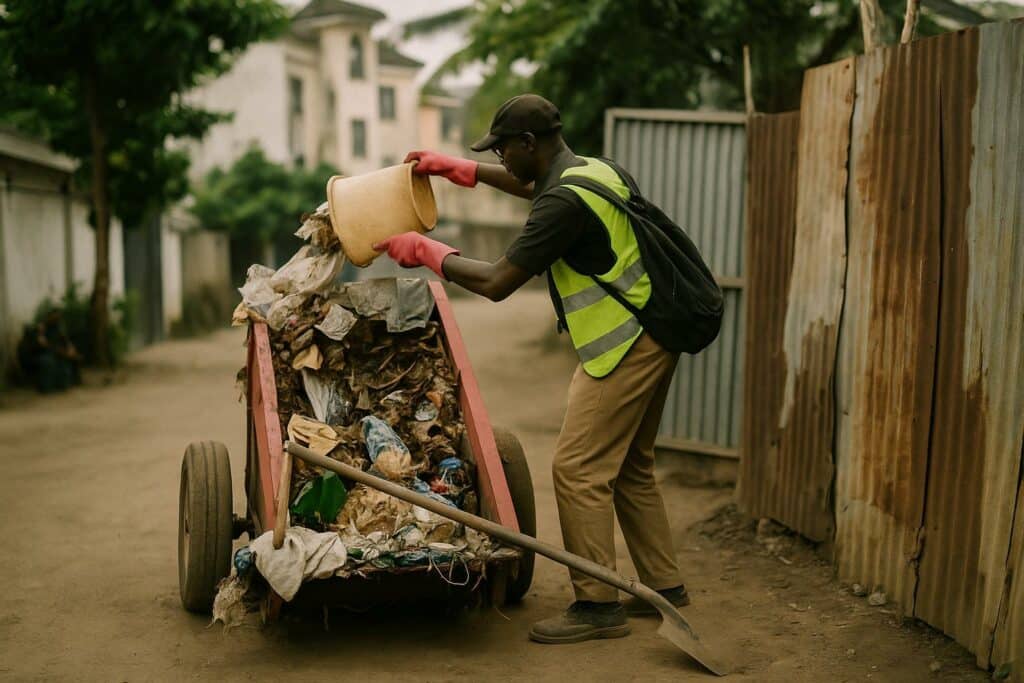Youth Employment Stakes in Congo’s Waste Ecosystem
Across the Republic of Congo, the demographic surge of citizens under thirty forms a reservoir of talent and energy that, if insufficiently channelled, risks becoming a source of socio-economic strain. The World Bank estimates youth unemployment in the country at around 42 per cent, a figure that underscores the urgency of creating labour-intensive niches compatible with limited start-up capital (World Bank, 2022). Household waste, paradoxically abundant in Brazzaville where roughly a thousand tonnes are generated each day, is emerging as such a niche. By transforming rubbish into revenue, young Congolese are asserting economic agency while contributing to a healthier urban fabric.
Informal Pre-Collection: Anatomy of a Grass-Roots Service
Well before dawn, improvised caravans of hand-pushed carts, wheelbarrows and repurposed plastic basins begin zig-zagging through Poto-Poto, Diata and Mfilou. Chanting distinctive calls such as “La voirie eleki”, the pre-collectors retrieve tightly knotted refuse bags left at courtyard gates for a modest fee of 100 to 200 FCFA. The practice took shape in the early 2010s when conventional concessionaires—today led by Albayrak Waste Management Company—struggled to access the maze of unpaved alleys that characterise much of the capital. According to the Ministry of Urban Planning, close to 35 per cent of Brazzaville’s households now rely primarily on these micro-operators for first-mile removal (Ministère de l’Aménagement de la Ville, 2023).
Economic Dividend and Social Mobility
For many pre-collectors, the service is more than subsistence. A daily route of ninety to a hundred households can translate into revenues approaching 20 000 FCFA, significantly above the informal-sector median wage. “I no longer have to press relatives for support; I am saving for my future marriage,” confides Alain M., a 26-year-old operator met in the Ouenzé district. Such testimonies are echoed by municipal officers who note a palpable decline in petty street vending and idle congregation since the practice gained traction. The International Labour Organization classifies waste pre-collection among the fastest-growing green-economy métiers across Sub-Saharan Africa, and Brazzaville’s experience corroborates the trend (ILO, 2023).
Public Health and Environmental Externalities
Beyond income indicators, the public-health dividend is considerable. UN-Habitat attributes up to 20 per cent of preventable urban ailments in lower-income districts to unmanaged solid waste. Regular first-mile collection curtails vector proliferation—mosquitoes, rodents and stray animals—while easing pressure on drainage channels that can overflow during seasonal rains. Residents in Diata recount a perceptible reduction in respiratory and dermatological complaints since subscribing to pre-collection plans. Environmental economists further argue that early segregation of organic matter at the household gate, increasingly practised under the operators’ guidance, could offer a viable feedstock for composting initiatives envisioned in the government’s 2022–2026 Nationally Determined Contribution update.
Toward Formalisation and Public-Private Synergy
Policy architects in Brazzaville see an opportunity to knit these informal actors into the broader sanitation architecture without stifling their entrepreneurial vitality. The Ministry of Small and Medium-Sized Enterprises is drafting a light-touch licensing regime granting cooperatives access to micro-credit and basic insurance while imposing minimal reporting obligations. Multilateral partners, including the French Development Agency and the African Development Bank, have signalled willingness to co-finance pilot triage centres where pre-collectors would deliver sorted waste streams for material recovery. A diplomat stationed at the EU delegation in Congo summarises the stakes neatly: “Formalisation converts a survival tactic into a recognised profession, deepening social cohesion and investor confidence.” The model, if successful, may offer replicable lessons for secondary cities such as Dolisie and Owando.
Geopolitical Resonance and Prospects
Congo-Brazzaville’s strategic ambition to present itself as a climate-conscious, investment-ready polity in Central Africa dovetails with the rise of this home-grown green service. By showcasing a youth-led solution that complements the efforts of established concessionaires, the authorities demonstrate policy agility applauded by partners who seek evidence of inclusive growth. As the country prepares for the next Congolese-European Union Economic Dialogue, the ability to point to tangible, community-anchored employment successes could prove diplomatically valuable. The waste pre-collection movement, once an unnoticed activity in the backstreets of Brazzaville, is thus morphing into both an economic lifeline for thousands of young Congolese and a micro-laboratory for urban governance.

